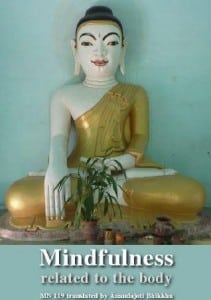 The Discourse about Mindfulness related to the Body was translated and published in 2008 by Anandajoti Bhikkhu. The discourse origins from the Majjhimanikaya of the Pali Canon and it contains many of the same meditation instructions given by the Buddha as the Ways of Attending to Mindfulness discourse, but with a different ending concerning the Absorptions also known as Jhanas.
The Discourse about Mindfulness related to the Body was translated and published in 2008 by Anandajoti Bhikkhu. The discourse origins from the Majjhimanikaya of the Pali Canon and it contains many of the same meditation instructions given by the Buddha as the Ways of Attending to Mindfulness discourse, but with a different ending concerning the Absorptions also known as Jhanas.
Download the free ebook here (34 pages/330 KB):
 The Discourse About Mindfulness related to the Body
The Discourse About Mindfulness related to the Body
What is The Majjhima Nikaya?
The Majjhima Nikaya, which translates to “Collection of Middle-Length Discourses,” is one of the five nikayas (collections) that make up the Sutta Pitaka, the scripture of the Theravada Buddhist tradition. The Sutta Pitaka is one of the three divisions of the Pali Canon, which is the authoritative scripture of Theravada Buddhism. The Majjhima Nikaya contains a collection of 152 discourses attributed to Gautama Buddha, the founder of Buddhism. These discourses cover a wide range of topics, including ethics, meditation, philosophy, and the nature of reality. They provide teachings and guidance for both monastic practitioners and lay followers.
The “middle-length” discourses
The discourses in the Majjhima Nikaya are generally longer than those found in the Digha Nikaya (Long Discourses) but shorter than those in the Samyutta Nikaya (Connected Discourses). Hence, they are referred to as “middle-length” discourses. The teachings in this collection are presented in the form of dialogues between the Buddha and various individuals, including monks, nuns, laypeople, and even deities. The Majjhima Nikaya is highly regarded within the Theravada tradition and is considered an essential source for understanding the Buddha’s teachings. It covers a wide range of topics relevant to the path of liberation and provides detailed instructions on meditation practices, ethical conduct, the Four Noble Truths, the Eightfold Path, and other fundamental aspects of Buddhism. The discourses in the Majjhima Nikaya offer profound insights into the nature of existence, the causes of suffering, and the methods to overcome it. They serve as a valuable guide for practitioners seeking to deepen their understanding of Buddhist philosophy and apply its principles to their lives.
You can buy the print version here: The Middle Length Discourses of the Buddha: A Translation of the Majjhima Nikaya

